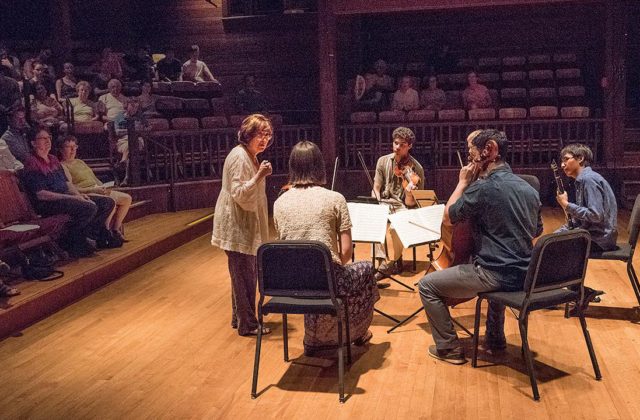Norfolk Chamber Music Festival Starts an Event-Filled Six-Week Run
By Wiley Wood
They start arriving on July 1, young musicians, most of them in graduate programs in the United States, but originally from four continents, coming to Norfolk to learn, rehearse and perform (or compose) chamber music with members of the faculty of the Yale School of Music and a distinguished cast of visiting artists. “There are 38 fellows this year,” says festival director Melvin Chen, “and the level is extremely high.”
They start right in with a bang, too. Most of them will perform in the Vienna-themed first concert, on Friday, July 6, either in a Richard Strauss suite for wind instruments, anchored by faculty members Stephen Taylor on oboe and William Purvis on horn; a pair of Johann Strauss waltzes, in chamber arrangements by Arnold Schoenberg; or a Korngold suite for strings and piano left hand commissioned by Paul Wittgenstein, featuring a newcomer to Norfolk, pianist Orion Weiss.
Also that first week, on Wednesday, July 4, some of the fellows will take part in their first public masterclass, conducted by members of the Brentano String Quartet, while others will perform in one of the emerging artist concerts, which are held on Thursday nights and Saturday mornings in the Music Shed amphitheater. These free events are among the favorites of Norfolk Festival regulars. The audience forms a close ring around the performers, ideal for chamber music. About the masterclasses, General Manager James Nelson says, “It gives the public a chance to see how an interpretation is formed.”
This summer’s festival celebrates the centenary of 1918, with selected programs relating to events of that year. Schoenberg’s arrangements of Strauss, Chen points out, were made for his Society for Private Musical Performance, founded in 1918. And the pianist Paul Wittgenstein lost his right arm to a bullet wound in World War I, which led to the Korngold commission. A program in early August will feature Stravinsky’s “The Soldier’s Tale,” which premiered in September 1918, and include two sonatas that Claude Debussy wrote during World War I as examples of anti-German music.
Before the Friday evening concerts, talks will be given at Battel House by the exuberant Paul Berry, a historian of chamber music on the Yale faculty, who plays or sings themes from the upcoming program, discusses the composer, sets the music in context, and generally shines a warm light on what could be abstruse corners of the musical world. These talks only started last year but, says Nelson, “Paul Berry quickly developed a fan club of his own here.” Attendees can tuck into a boxed picnic dinner beforehand, ordered from the festival website.
The second-phase renovations at the Music Shed are now complete. These include new ceiling fans and refurbished windows for increased air circulation, and new LED spotlights, which will sharply reduce energy consumption and the temperature on stage for performers, yet keep the same level of illumination.
About 30 concerts are planned during the six weeks of the festival, many of them free, many of them featuring artists of international renown. Dawn Upshaw, a recent MacArthur fellow, will sing Respighi; Melvin Chen will play piano and violin, though not at the same concert; the Emerson Quartet will perform late Beethoven; bassoon virtuoso Frank Morelli will take on Saint-Saens; and much, much more.
Asked what program he particularly looks forward to, Nelson named the gala concert by the Philharmonia Baroque Orchestra on Saturday, July 21. The musicians play on “historically informed” or historic instruments: the flutes are of wood, the string instruments use gut, not steel, the horns have no pistons or valves. “I have always loved the sound of a baroque orchestra,” says Nelson.
A complete preview of the upcoming season is available online at norfolkmusic.org.
Photo, top, by Bruce Frisch: Violinist Ani Kavafian discusses points of interpretation with the members of a young string quintet during a Wednesday night masterclass in the Music Shed amphitheater.

